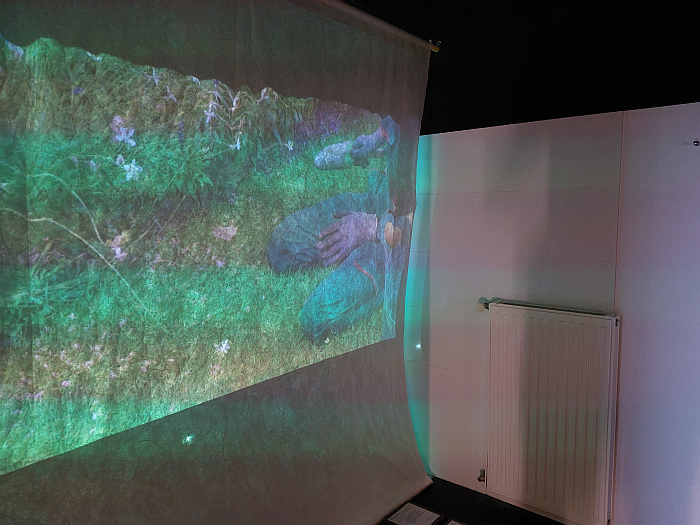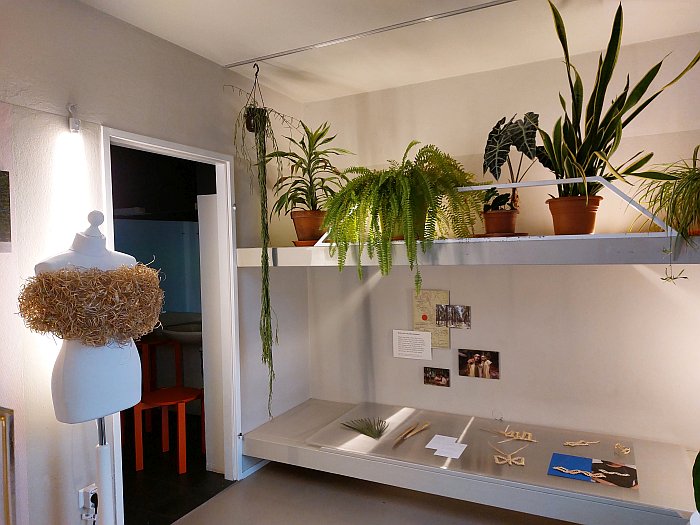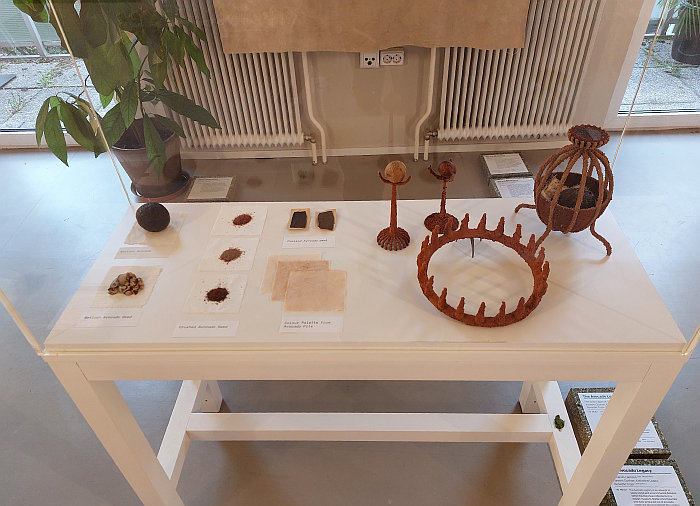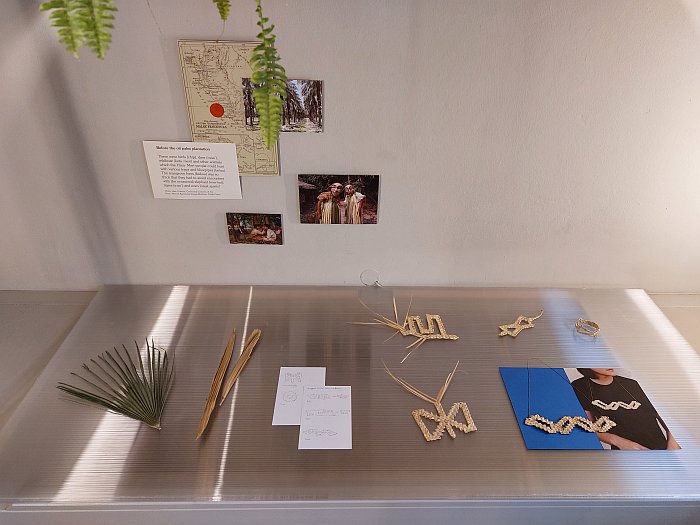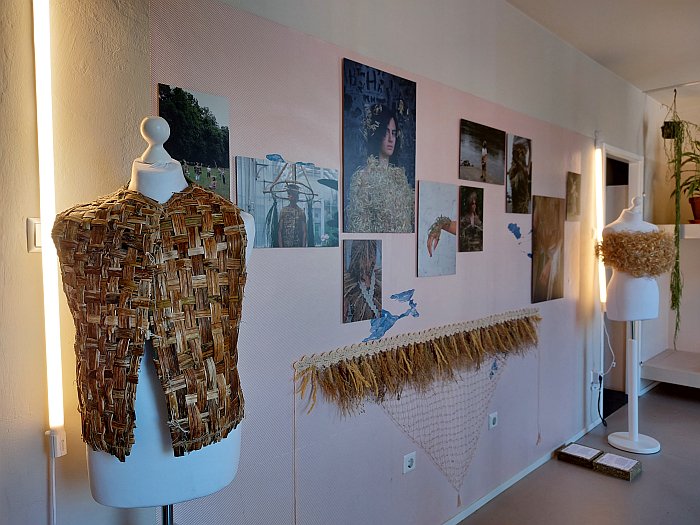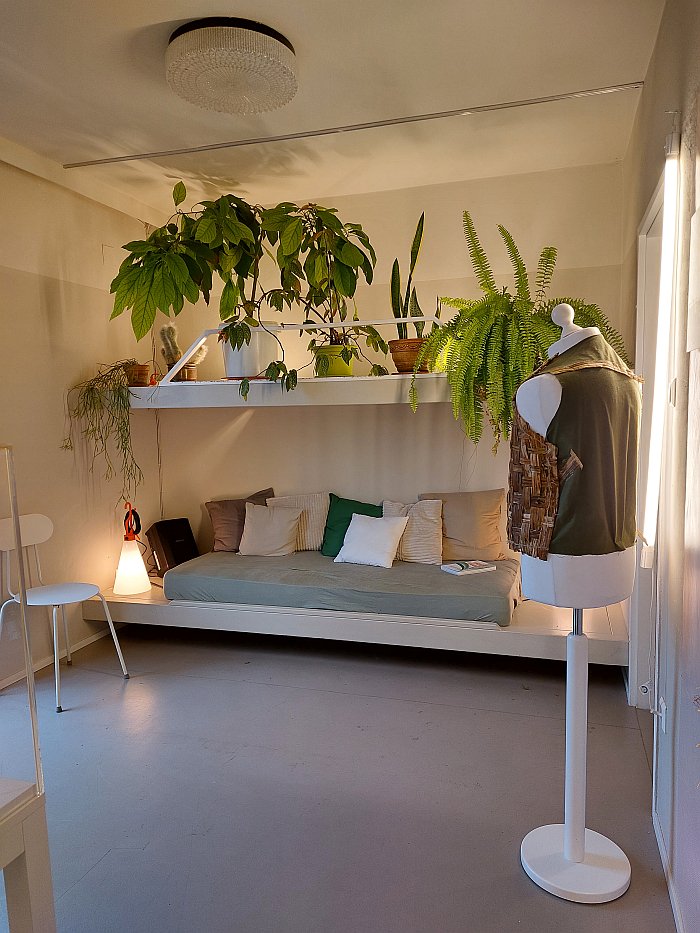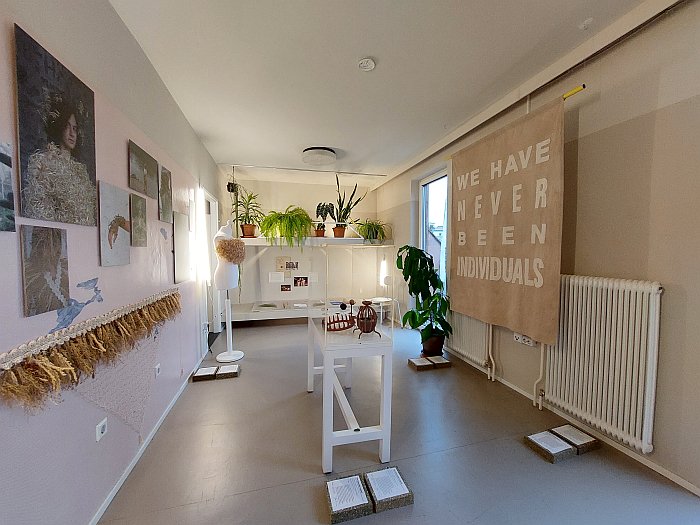
As noted from the exhibtion Plant Fever. Towards a Phyto-centred design at Schloss Pillnitz, Dresden, a component of its tenure in Dresden was its integration into the 2023 Design Campus Summer School, a platform of the Kunstgewerbemuseum Dresden, a platform under the direction in 2023 of Studio d-o-t-s a.k.a. Laura Drouet and Olivier Lacrouts, curators of Plant Fever; and in which context the Summer School participants developed projects based on the themes discussed and the issues raised by Plant Fever. Projects which were presented at a series of events at Pillnitz over the summer; events we did plan to attend, but always found ourselves far from Pillnitz on those days. And indeed on all other days over the summer
Fortuitously the projects came to Vienna Design Week 2023 where they, or at least some, we're not entirely sure, were presented as the programmatically titled Room for Change; and while, sadly, no-one took up our suggestion to employ Schloss Pillnitz's 200 year old Camellia as the basis for an exploration of Colonialism in our parks and gardens, nor felt motivated to explore future solutions for historic gardens in an age of climate change, or to develop approaches to relieve gardeners from the physical stresses, strains and harms of weeding, they did develop, amongst other projects.......
The Avocado Legacy by Fernando Laposse, Kareem Goshan, Katherine Lopez and Benedikt Trojet which saw the quartet develop a series of objects from biomaterials derived from avocado waste and coloured by avocado based dyes; a project which on the on hand very nicely underscores that there are alternatives to synthetic plastics, metals and similar materials whose life cycles invariably impact on the environment, while also highlighting that any and all materials we use invariably come with the baggage of problems - the vast monoculture of fashionable food crops, such as avocados are/were, we've lost track, and for all when that industrial monoculture involves clearing forests to create space, or the use of farm land to grow for industry rather than for food, as currently neatly exemplified by the acres of farmland employed to grow cattle feed, being two of the more obvious ones, and tending to underscore that reducing our consumption, and consuming better and more long term is the only viable option; or We Are All Lichens by Natalia Cerda Milla, which we're not, or at least not biologically, however through a study of lichens, through learning from plants rather than learning to use plants, one of those recurring themes in Plant Fever, Natalia reminds us all that, much like lichens, the inherent, and essential, communal nature of human society, our ongoing interaction with other humans, the permanent communication and interchange with the environment around us, means that, as the large flag created by Natalia states: "We have never been individuals". A position which brings us all back to the pair of Asics Gel 1090 trainers Bettina Willnauer employs in her work My Private Space in a Private Space as seen in Garten at Galerie Rauminhalt, Vienna, and extends the question of why artists/designers/architects all dress the same, to why we all dress the same, why the vestural monoculture if clothes are an expression of our unique characters and natures?
Speaking of which, Room for Change also presented the clothing collection Harvest... the word used in the Vienna showcase was "fashion collection" which we'd argue is a misnomer because surely, ¿surely?, one of the key factors of Harvest, being as it is a collection inspired by the natural context of the River Elbe as it flows past Schloss Pillnitz and the constructed reality of the Pillnitz gardens, is that it is not 'fashion' but something long-term, slow, sustainable and rooted in more than quick commercial gain and the selfish desire to be a t****, ¿surely?... a clothing collection crafted from raw, unprocessed, plant material and developed by Emma Bruschi, Davide Balda, Jaqueline Lobodda, Deborah Egger, Sahra Jajarmikhayat, Ano Jiskariani, Chi Tran, Suija Wang and Dana Zoutman, which is by far the largest list of participants for any single project featured in Room for Change, which is a reality we're not sure how to interpret. So we won't try.......
.......and move onto the short film Plant Circus by Katharina Mludek, Katrin Schwarz and Julia Sulikowska which captures the movements of visitors and gardeners in and to the Schloss Pillnitz gardens: the actions of former tending to allude to the ritualistic of visiting an historic park, the well practised routes we take through a visit to any historic garden; the actions of the latter, for the three film-makers, representing the "recurrent, seemingly absurd, performative acts of the gardeners", such as getting down on their knees to weed flower beds, one of those acts that, as we all know, if it were one office workers were obliged to repeat multiple times a day would long since have been banned on account of the very obvious negative consequences for the employee's health, as would a great many other "recurrent, seemingly absurd, performative acts" Plant Circus so delights in. But which as an act of physical harm is OK if its only gardeners; the main thing, obviously, is that there are no weeds to irritate the visitors gaze. Yes, the lack of thought, the lack of reflection, the acceptance, did wind us up. Also because gardening is one area where there is definitely ample room for change. Where designers can offer more than ergonomic spades. Alone the motivation and insight for that change is lacking.
Similarly offering room for change, but awaiting serious efforts at that change, is appreciations of the (hi)story of Colonialism, Imperialism et al on European parks and gardens and horticulture, that theme which Of Gardens and People. Designed Nature, Art and Landscape Architecture at the Austrian National Library, Vienna, regrettably found no space for. And while, as noted at the top, our suggestion to reflect more critically on Schloss Pillnitz's much celebrated 200 year old Camellia went unheeded, with the project Chita' Anyaman with its reflections on the consequences of British oil palm cultivation in Malaysia on the people of the Hma' Meri and thus on the historic and ongoing legacy of British Colonialism, Evey Kwong did bring that most important subject into the light.
And amongst all the student projects, a particular highlight, for us, of Room for Change is and was the scenography featuring plants supplied by Vienna based mischer'traxler studio from their own flat. A production decision, borrowing friends plants rather than buying plants and then trying find a way to rid oneself of them, undertaken by way of greening the presentation space in a sustainable, low-impact manner of which can one can only approve; whereby, we really, really, hope Katharina Mischer and Thomas Traxler were on holiday during Vienna Design Week, needed someone to water their plants and found willing volunteers in d-o-t-s and the Kunstgewerbemuseum Dresden.
Vienna Design Week 2023 has now finished, details of what you missed, while you await the announcement of details of Vienna Design Week 2024, can be found at www.viennadesignweek.at
More detail on Plant Fever can be found at https://plantfever.com
And more information on the Design Campus Summer School can be found at https://designcampus.org
